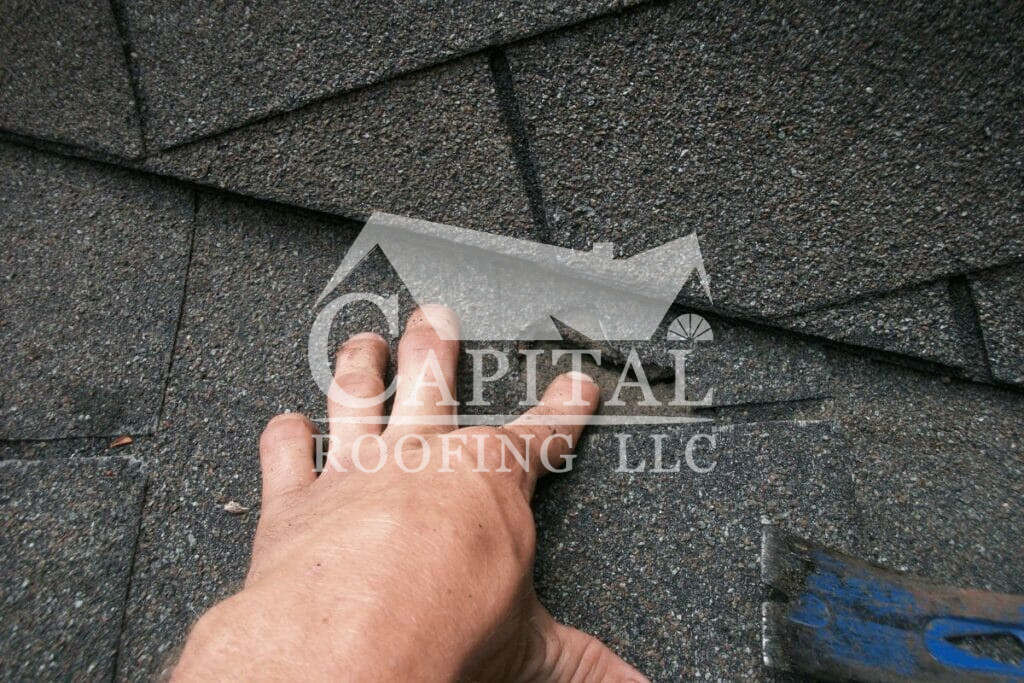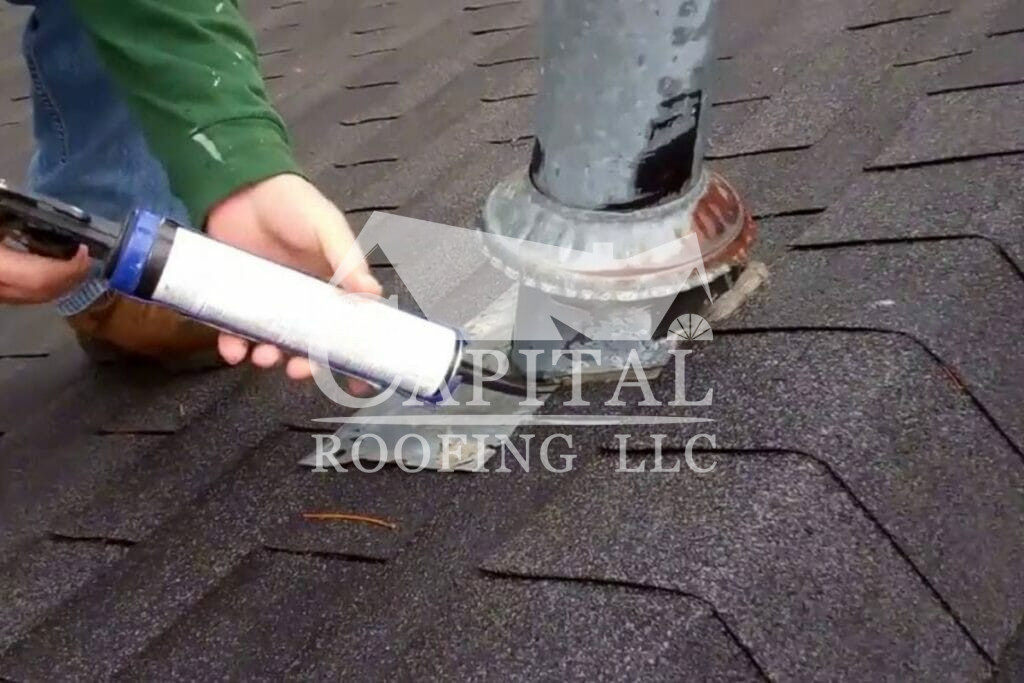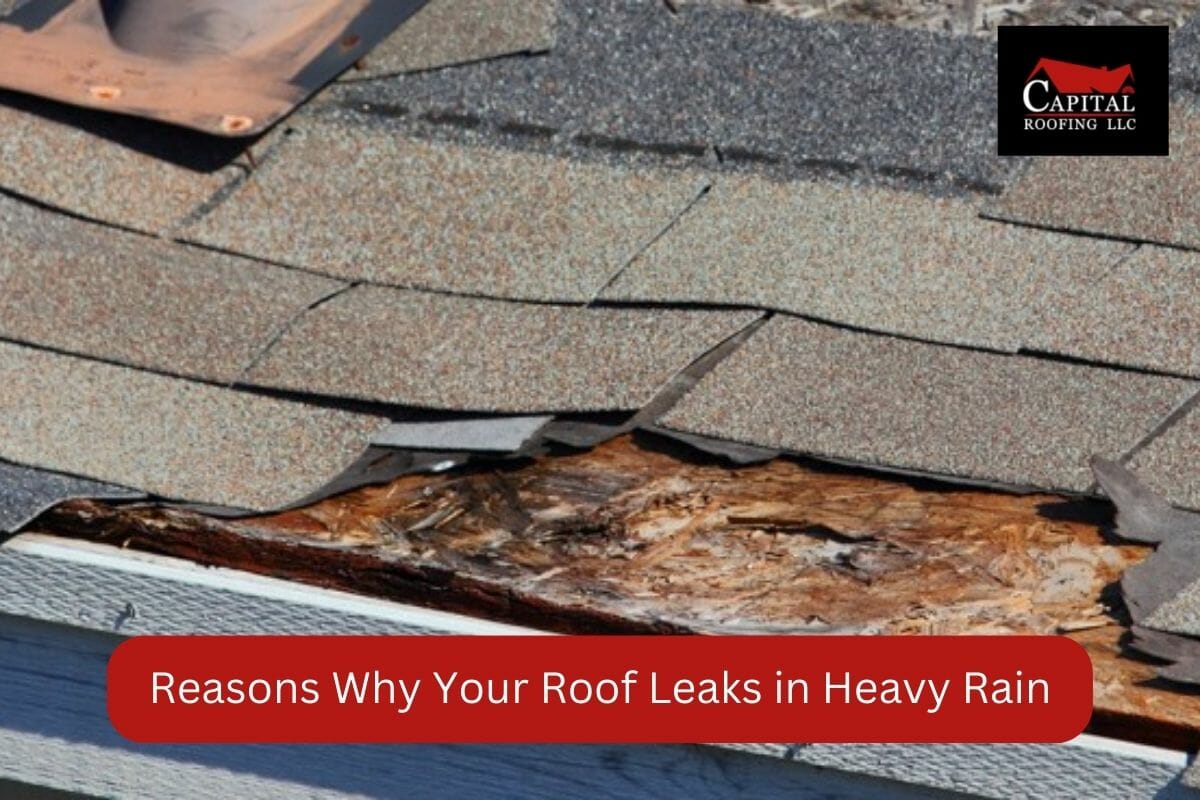When heavy rain starts pouring down, homeowners often find themselves feeling stressed and worried, and for a good reason – the possibility of a roof leak may become a significant concern. Questions such as, why does my roof leak in heavy rain, may come to mind. This is what we are here to talk about.
Understanding the reasons behind roof leaks in heavy rain can help you identify the problem and take appropriate measures to fix it. In this comprehensive guide, we will explore seven common causes of roof leaks during heavy rainfall and provide insights on how to address them effectively.
1. Damaged or Inadequate Flashing
One of the most common culprits behind both shingle and metal roof leaks in heavy rain is damaged or inadequate flashing. Flashing is a thin strip of material, typically made of metal, that is installed around roof penetrations such as chimneys, skylights, and vents to prevent water from seeping into the roof. Over time, flashing can become rusted, cracked, or improperly installed, allowing water to infiltrate your home. Regular inspection and maintenance of flashing are essential to ensure its effectiveness in keeping your roof watertight.
2. Damaged Shingles
Another common reason why a shingle roof leaks in heavy rain is that the shingles are damaged. Shingles, especially asphalt shingles, are vulnerable when it comes to facing rains and heavy storms. Over time, shingles can deteriorate due to exposure to harsh weather conditions, leading to cracks, curling, or missing pieces. These are not easily visible and, therefore, can be easily missed when viewing your roof. So, when heavy downpours hit your roof, water can penetrate through these damaged shingles, causing roof leaks.
Regular roof inspections and maintenance are crucial to identify and address damaged shingles promptly. By replacing or repairing damaged shingles, you can prevent water from infiltrating your roof during heavy rain.
3. Clogged Gutters and Downspouts
Clogged gutters and downspouts can contribute to roof leaks during heavy rain. When debris, such as leaves, twigs, and dirt, accumulate in your gutters, it can block the flow of water, causing it to overflow onto your roof. The excess water can then seep into your home, leading to roof leaks.
It’s not only gutters that can get clogged, but the same thing can happen at, or near, your roof valleys as well. When heavy rains are accompanied by strong winds, debris can accumulate along these roof valleys. This stops the water from flowing down to the gutters and instead causes it to pool on top of the roofing material. This can be an even bigger problem if your roof valleys are not properly sealed, or were not installed properly.
4. Faulty Skylights
Skylights are a popular feature in many homes, providing natural light and a sense of openness. However, they can also be a source of roof leaks during heavy rain if not properly installed or maintained. Damaged or improperly sealed skylights can allow water to enter your home, resulting in leaks.
If you have skylights, it’s essential to inspect them regularly for any signs of damage or deterioration. Ensure that the seals and flashing are intact and that there are no cracks or gaps around the skylight frame.
If you currently don’t have a skylight, but are planning to add a skylight to your roof, then make sure that you hire a professional contractor and install skylights from reputable manufacturers so leaks are less likely to occur.
5. Improperly Sealed Pipe Boots
Pipe boots, which are rubber or metal coverings around plumbing vent pipes, are designed to create a watertight seal. However, over time, the seals can degrade or become damaged. This can be due to harsh conditions such as prolonged exposure to the sun. When these develop cracks, the water can pass through them when it starts to rain heavily. Additionally, exposure to the sun and other elements can cause the materials of the pipe boot to crack or deteriorate.
Pipe boots last for a certain time, which is usually around 8 to 12 years. Apart from regular inspections, consider replacing your pipes when they are nearing the end of their lifespan.
6. Condensation Issues In Your Building
Condensation and inadequate ventilation in the attic can contribute to roof leaks during heavy rain. When warm, moist air from inside the house rises and meets the cold roof surface, it can condense into water droplets. Over time, this condensation can accumulate and damage the roofing structure, leading to leaks.
Proper attic ventilation is crucial as it allows air to circulate, preventing excess moisture buildup. Solutions to address ventilation issues include installing ridge vents, soffit vents, or attic fans to promote airflow and reduce condensation. Adequate insulation and sealing air leaks in your attic can also help maintain proper ventilation and prevent leaks caused by condensation.
7. Structural Damage
Structural damage is a significant cause of roof leaks during heavy rain. This could arise from a variety of factors such as severe weather events, falling tree limbs, or even animals. For instance, a storm may lead to hefty branches or other debris colliding with the roof, creating holes or severe dents. Similarly, certain wildlife can cause damage by gnawing or scratching at the roofing materials.
These breaches in the roof’s integrity allow rainwater an unobstructed path into the home. During heavy rainfall, these leaks become particularly noticeable and problematic, as the volume of water infiltrating the structure increases, which can lead to substantial damage to the interior of the home. Regular roof inspections are critical in identifying and repairing such structural damage before leaks occur.
How Do I Stop My Roof Leaking In Heavy Rain?

Whether you are worried about pitched roof leaks or flat roof leaks in heavy rain, there are some ways in which you can minimize the roof leaks till the pros arrive. Here are some tips you can follow to stop your roof leaking in heavy rain:
Identify the Source:
The first step is to find the leak’s source. Carefully inspect the interior of your home for water stains or signs of moisture near the ceiling or walls. Trace the path of the water to locate the general area of the roof leak.
Take Temporary Measures:
When the extent of the leak is severe, it is time to start taking preventive measures. In cases of immediate leaks, use a roof tarp or plastic sheeting to cover the affected area and prevent further water damage. Secure the tarp tightly to avoid water penetration.
If you are not sure how to do this, you can read our blog post on how to tarp a roof leak for the best results.
Seek Professional Help:
Temporary measures work but can only take you so far. If the leak persists or if you are uncomfortable performing repairs yourself, it is advised that you seek professional assistance. Contact your local roofing contractor to take care of the leak.
Conclusion
Roof leaks in heavy rain can be a homeowner’s nightmare, but understanding the causes can help you prevent and address them effectively. Regular roof inspections, maintenance, and prompt repairs are crucial to maintaining the integrity of your roof and preventing water damage.
Remember, taking proactive measures to prevent roof leaks and promptly addressing any issues can save you from costly repairs and protect your home from water damage.
Facing Trouble With Your Roof? We Can Help

Roof leaks in heavy rain can create bigger issues if left unaddressed. If you’re unsure about the condition of your roof or need assistance with repairs, it’s always best to consult a professional roofing contractor such as the team of Capital Roofing. With our expertise, you can address any issues and ensure the protection of your home, even during the heaviest of rains. Contact us today at (918) 260-4075 to keep your home safe and dry, no matter how heavy the rain may be.

